Uncategorized
Mass Adoption of Web3 Through the Self-Writing Internet

Today, hundreds of millions of people own bitcoin and other tokens hosted on blockchains worth trillions of dollars.
Increasingly, though, blockchains host far more than tokens. In fact, blockchains are our future tech stack, and they can host sophisticated Web apps too, which live fully-onchain, just like tokens. These apps are implemented entirely from network-resident code (i.e. smart contract software and its evolutions).
This has huge potential: by the end of 2025, more than 5 billion people will own internet-connected smartphones with Web browsers. So what might drive them to create and use fully-onchain web apps, which can sport seamless Web3 functionality?
I believe a new blockchain revolution is imminent, thanks to advancing AI and “self-writing app” technology.
This relates to an important emerging trend called “vibe coding.” Vibe coding involves software engineers using tools with integrated AI that can write and fix software code on their behalf, making them much more productive.
The self-writing apps paradigm takes this much further, by enabling non-technical users to create, own and update apps simply by instructing AI over chat. For reasons I will explain, blockchain is in a unique position to help bring this revolutionary functionality to the world.
In the future, an individual will be able to create a personal branding website, or something like a custom wedding planning app for a family member getting married, just by talking to AI. An entrepreneur without technical staff or money will be able to create a new kind of e-commerce website, or build a sharing economy app with Web3 rails. And, an enterprise will be able to create sophisticated CRM functionality, for an infinitesimally small fraction of the investment in time and money that is currently required. All just by talking, without the need for software engineering or systems administration skills.
In this new development paradigm, everyday users will issue instructions to AI over chat, and simply refresh their web browser moments later to interact with their new or updated app.
Apps living on blockchains have a number of valuable features. They are sovereign and censorship-resistant, because they live on a public network, they are tamperproof, which means they are secure without depending on cybersecurity, incredibly resilient, and can seamlessly integrate powerful web3 functionalities because they live on-chain.
In addition, blockchain technology solves major problems involved with having AI build solo on traditional IT.
For example, the code that runs on traditional IT must be written carefully to avoid introducing security holes, and the whole platform is sensitive to security configurations, from cloud accounts, to operating systems running on cloud instances like Linux, to hosted platform software such as databases and web servers. This means traditional IT infrastructure must often be further protected by cybersecurity systems such as firewalls and anti-malware. Failover, and backup and restore, are another concern, and service providers must be trusted.
Trusting AI to build solo on traditional IT is a stretch, because even a single mistake can lead to a cyberattack that results in data exfiltration, or ransomware encrypting data.
Blockchains make it far easier for AI to build solo in many different ways. For example, the network-resident code blockchains host is “serverless,” greatly simplifying the coding tasks AI must perform, allowing code to be produced faster. On the Internet Computer network, code can also serve secure interactive web experiences directly to end users, and can store and process massive amounts of data efficiently, and even be used to build things such as a fully-onchain social network (e.g oc.app) or an important enterprise application.
At DFINITY, we are great believers in self-writing apps running on public blockchains, which we term the “self-writing internet,” and have been developing supporting technologies for some years.
For self-writing apps to reach their maximum potential, it must be possible not only for users to create them by talking, but also to continue updating and improving them in production, so they can talk until they have what they need, or a design that is optimal. Unless users can continue updating apps running in production, the total market addressed by the self-writing app paradigm will reach only a tiny fraction of its tremendous potential.
DFINITY has been developing a programming language framework called Motoko for usage by AI, as well as humans. When a user updates an app by adding or changing functionality, the AI must also describe how to update the structure of data inside the app, so that none is lost. When the AI tries to install an update, the framework is able to detect if a mistake has been made that would cause even a small amount of data to be lost unintentionally, so that it can ask the AI to try again.
We believe the self-writing internet will democratize and decentralize tech on blockchain, and are excited that a new platform called Caffeine.ai will soon be released. Just by interacting with Caffeine over chat, users will create, own and update sovereign apps on the Internet Computer, and the World Computer more broadly, which for us is the amalgamation of all blockchains that can host tokens and smart contract software.
In the future, it will be possible to say “build me a personal Google Photos, which I can share with my family and friends, where we can add comments and emoji reactions to photos,” or “build me a remittance system so I can pay my international contractors using stablecoins.”
On blockchains, human imagination, rather than technical skills, will increasingly be the limit when creating web apps. The utility unlocked will drive massive adoption of blockchain – although, oftentimes, users may not be aware that blockchain lies behind their game-changing experiences.
I have long talked about a “blockchain singularity” occurring where decentralized networks become a major new tech stack. I think this is how we get there, and the future is almost here.
Uncategorized
AI, Mining News: GPU Gold Rush: Why Bitcoin Miners Are Powering AI’s Expansion

When Core Scientific signed a $3.5 billion deal to host artificial intelligence (AI) data centers earlier this year, it wasn’t chasing the next crypto token — it was chasing a steadier paycheck. Once known for its vast fleets of bitcoin mining rigs, the company is now part of a growing trend: converting energy-intensive mining operations into high-performance AI facilities.
Bitcoin miners like Core, Hut 8 (HUT) and TeraWulf (WULF) are swapping ASIC machines — the dedicated bitcoin mining computer — for GPU clusters, driven by the lure of AI’s explosive growth and the harsh economics of crypto mining.
Power play
It’s no secret that bitcoin mining requires an extensive amount of energy, which is the biggest cost of minting a new digital asset.
Back in the 2021 bull run, when the Bitcoin network’s hashrate and difficulty were low, miners were making out like bandits with margins as much as 90%. Then came the brutal crypto winter and the halving event, which slashed the mining reward in half. In 2025, with surging hashrate and energy prices, miners are now struggling to survive with razor-thin margins.
However, the need for power—the biggest input cost—became a blessing in disguise for these miners, who needed a different strategy to diversify their revenue sources.
Due to rising competition for mining, the miners continued to procure more machines to stay afloat, and with it came the need for more megawatts of electricity at a cheaper price. Miners invested heavily in securing these low-cost energy sources, such as hydroelectric or stranded natural gas sites, and developed expertise in managing high-density cooling and electrical systems—skills honed during the crypto boom of the early 2020s.
This is what captured the attention of AI and cloud computing firms. While bitcoin relies on specialized ASICs, AI thrives on versatile GPUs like Nvidia’s H100 series, which require similar high-power environments but for parallel processing tasks in machine learning. Instead of building out data centers from scratch, taking over mining infrastructure, which already has power ready, became a faster way to grow an increasing appetite for AI-related infrastructure.
Essentially, these miners aren’t just pivoting—they’re retrofitting.
The cooling systems, low-cost energy contracts, and power-dense infrastructure they built during the crypto boom now serve a new purpose: feeding the AI models of companies like OpenAI and Google.
Firms like Crusoe Energy sold off mining assets to focus solely on AI, deploying GPU clusters in remote, energy-rich locations that mirror the decentralized ethos of crypto but now fuel centralized AI hyperscalers.
Terraforming AI
Bitcoin mining has effectively «terraformed» the terrain for AI compute by building out scalable, power-efficient infrastructure that AI desperately needs.
As Nicholas Gregory, Board Director at Fragrant Prosperity, noted, «It can be argued bitcoin paved the way for digital dollar payments as can be seen with USDT/Tether. It also looks like bitcoin terraformed data centres for AI/GPU compute.»
This pre-existing «terraforming» allows miners to retrofit facilities quickly, often in under a year, compared to the multi-year timelines for traditional data center builds. Firms like Crusoe Energy sold off mining assets to focus solely on AI, deploying GPU clusters in remote, energy-rich locations that mirror the decentralized ethos of crypto but now fuel centralized AI hyperscalers.
Higher returns
In practice, it means miners can flip a facility in less than a year—far faster than the multi-year timeline of a new data center.
But AI isn’t a cheap upgrade.
Bitcoin mining setups are relatively modest, with costs ranging from $300,000 to $800,000 per megawatt (MW) excluding ASICs, allowing for quick scalability in response to market cycles. Meanwhile, AI infrastructure demands significantly higher capex due to the need for advanced liquid cooling, redundant power systems, and the GPUs themselves, which can cost tens of thousands per unit and face global supply shortages. Despite the steeper upfront costs, AI offers miners up to 25 times more revenue per kilowatt-hour than bitcoin mining, making the pivot economically compelling amid rising energy prices and declining crypto profitability.
A niche industry worth billions
As AI continues to surge and crypto profits tighten, bitcoin mining could become a niche game—one reserved for energy-rich regions or highly efficient players, especially as the next in 2028 could render many operations unprofitable without breakthroughs in efficiency or energy costs.
While projections show the global crypto mining market growing to $3.3 billion by 2030, at a modest 6.9% CAGR, the billions would be overshadowed by AI’s exponential expansion. According to KBV Research, the global AI in mining market is projected to reach $435.94 billion by 2032, expanding at a compound annual growth rate (CAGR) of 40.6%.
With investors already seeing dollar signs in this shift, the broader trend suggests the future is either a hybrid or a full conversion to AI, where stable contracts with hyperscalers promise longevity over crypto’s boom-bust cycles.
This evolution not only repurposes idle assets but also underscores how yesterday’s crypto frontiers are forging tomorrow’s AI empires.
Uncategorized
Bitcoin Climbs as Economy Cracks — Is it Bullish or Bearish?

Bitcoin (BTC) is about 4% higher than it was a week ago—good news for the digital asset but bad news for the economy.
The recent negative tone of the economic data points from last week raised expectations that the Federal Reserve will cut interest rates on Wednesday, making riskier assets such as stocks and bitcoin more attractive.
Let’s recap the data that backs up that thesis.
The most important one, the U.S. CPI figures, came out on Thursday. The headline rate was slightly higher than expected, a sign inflation might be stickier than anticipated.
Before that, we had Tuesday’s revisions to job data. The world’s largest economy created almost 1 million fewer jobs than reported in the year ended March, the largest downward revision in the country’s history.
The figures followed the much-watched monthly jobs report, which was released the previous Friday. The U.S. added just 22,000 jobs in August, with unemployment rising to 4.3%, the Bureau of Labor Statistics said. Initial jobless claims rose 27,000 to 263,000 — the highest since October 2021.
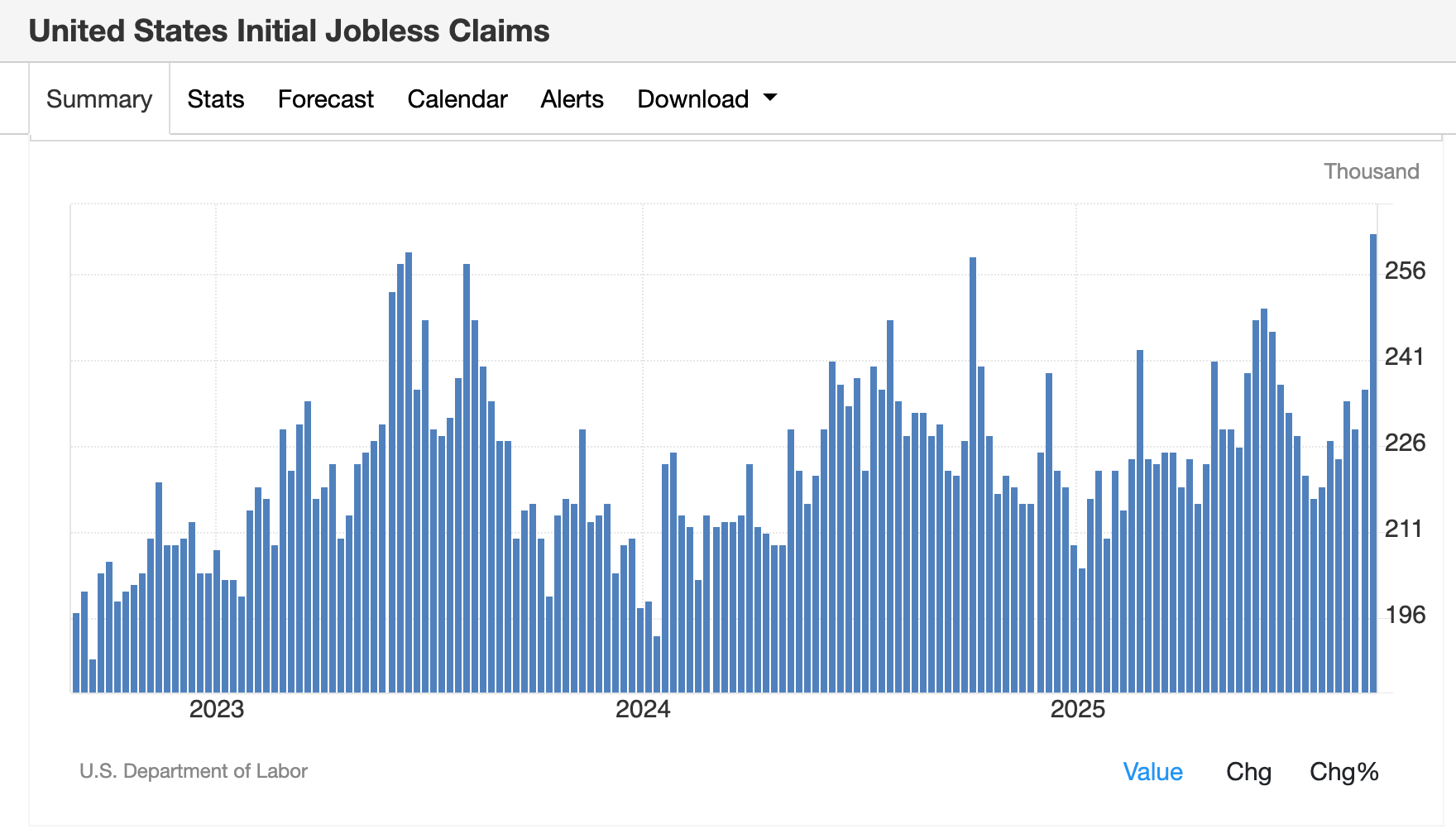
Higher inflation and fewer jobs are not great for the U.S. economy, so it’s no surprise that the word «stagflation» is starting to creep back into macroeconomic commentary.
Against this backdrop, bitcoin—considered a risk asset by Wall Street—continued grinding higher, topping $116,000 on Friday and almost closing the CME futures gap at 117,300 from August.
Not a surprise, as traders are also bidding up the biggest risk assets: equities. Just take a look at the S&P 500 index, which closed at a record for the second day on the hope of a rate cut.
So how should traders think about BTC’s price chart?
To this chart enthusiast, price action remains constructive, with higher lows forming from the September bottom of $107,500. The 200-day moving average has climbed to $102,083, while the Short-Term Holder Realized Price — often used as support in bull markets — rose to a record $109,668.
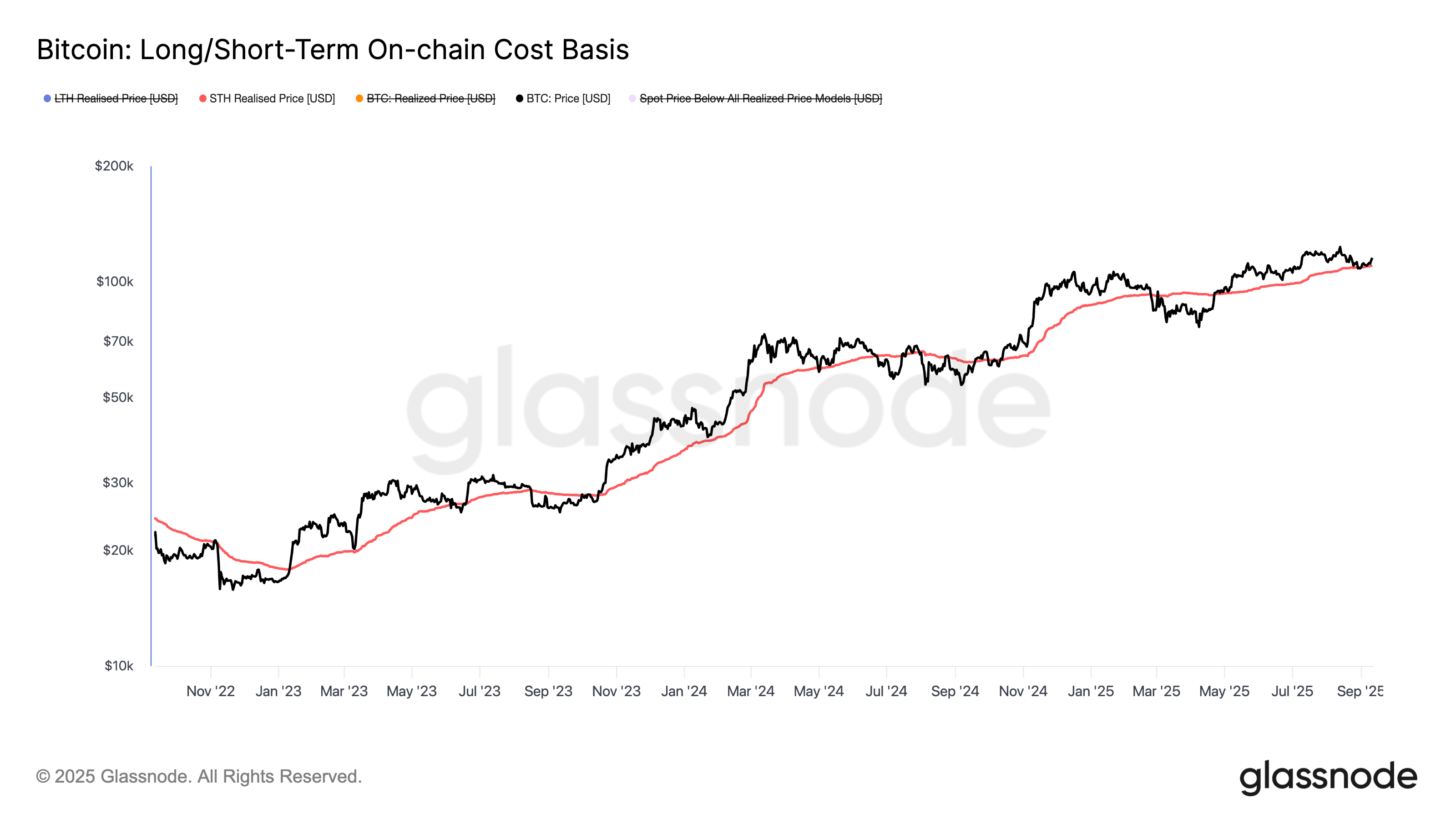
Bitcoin-linked stocks: A mixed bag
However, bitcoin’s weekly positive price action didn’t help Strategy (MSTR), the largest of the bitcoin treasury companies, whose shares were about flat for the week. Its rivals performed better: MARA Holdings (MARA) 7% and XXI (CEP) 4%.
Strategy (MSTR) has underperformed bitcoin year-to-date and continues to hover below its 200-day moving average, currently $355. At Thursday’s close of $326, it’s testing a key long-term support level seen back in September 2024 and April 2025.
The company’s mNAV premium has compressed to below 1.5x when accounting for outstanding convertible debt and preferred stock, or roughly 1.3x based solely on equity value.
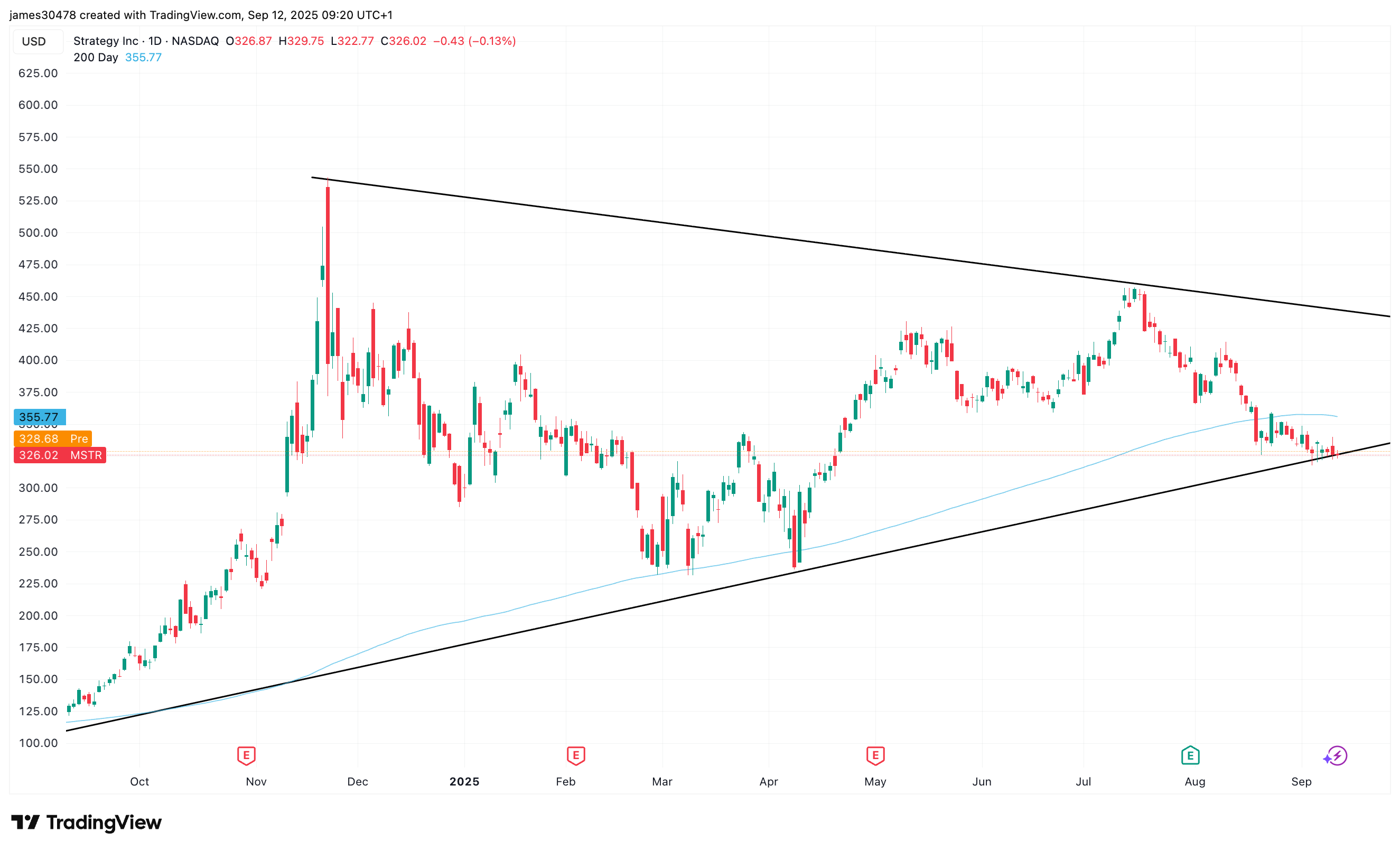
Preferred stock issuance remains muted, with only $17 million tapped across STRK and STRF this week, meaning that the bulk of at-the-money issuance is still flowing through common shares. According to the company, options are now listed and trading for all four perpetual preferred stocks, a development that could provide additional yield on the dividend.
Bullish catalysts for crypto stocks?
The CME’s FedWatch tool shows traders expect a 25 basis-point U.S. interest-rate cut in September and have priced in a total of three rate cuts by year-end.
That’s a sign risk sentiment could tilt back toward growth and crypto-linked equities, underlined by the 10-year U.S. Treasury briefly breaking below 4% this week.
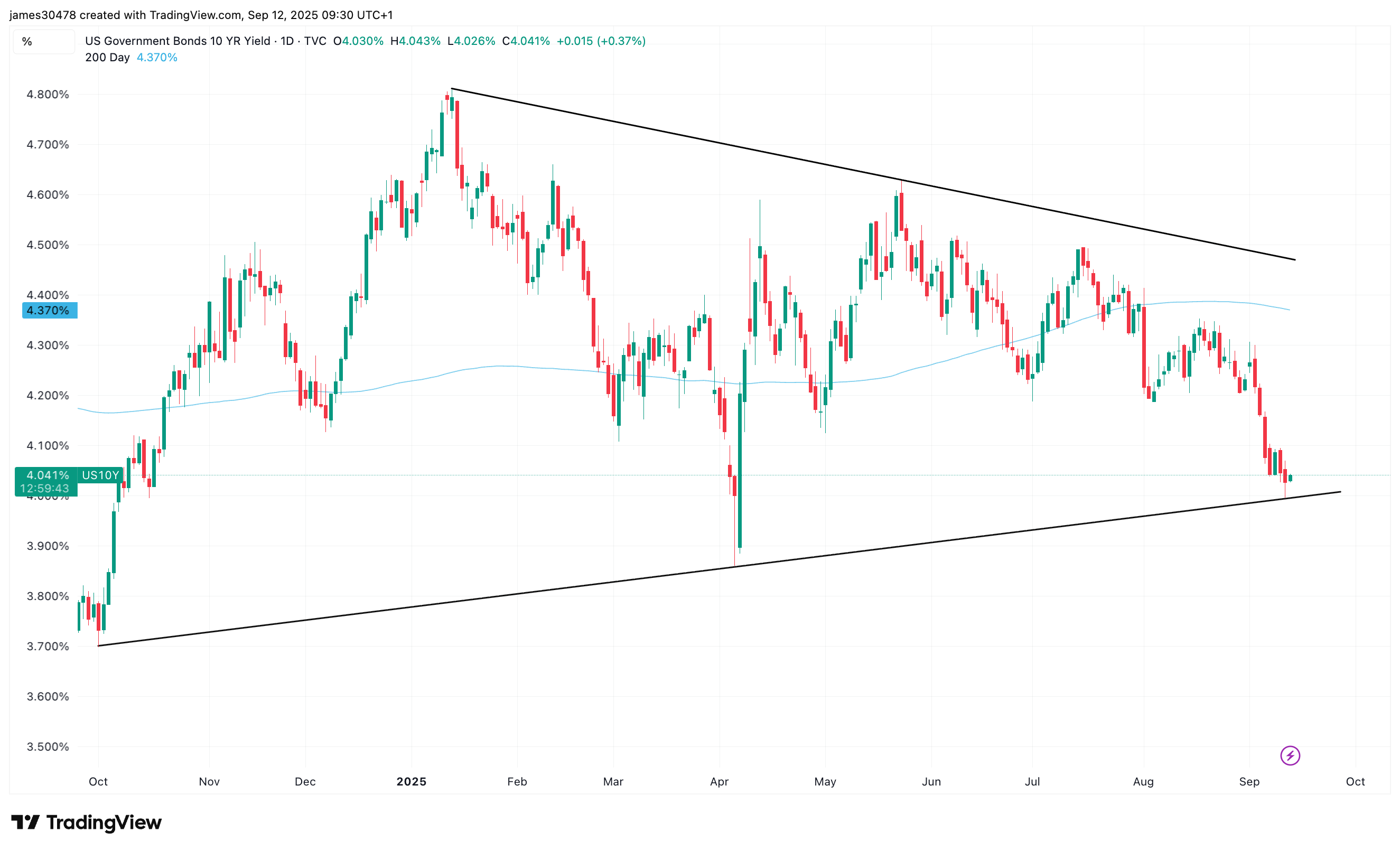
Still, the dollar index (DXY) continues to hold multiyear support, a potential inflection point worth watching.
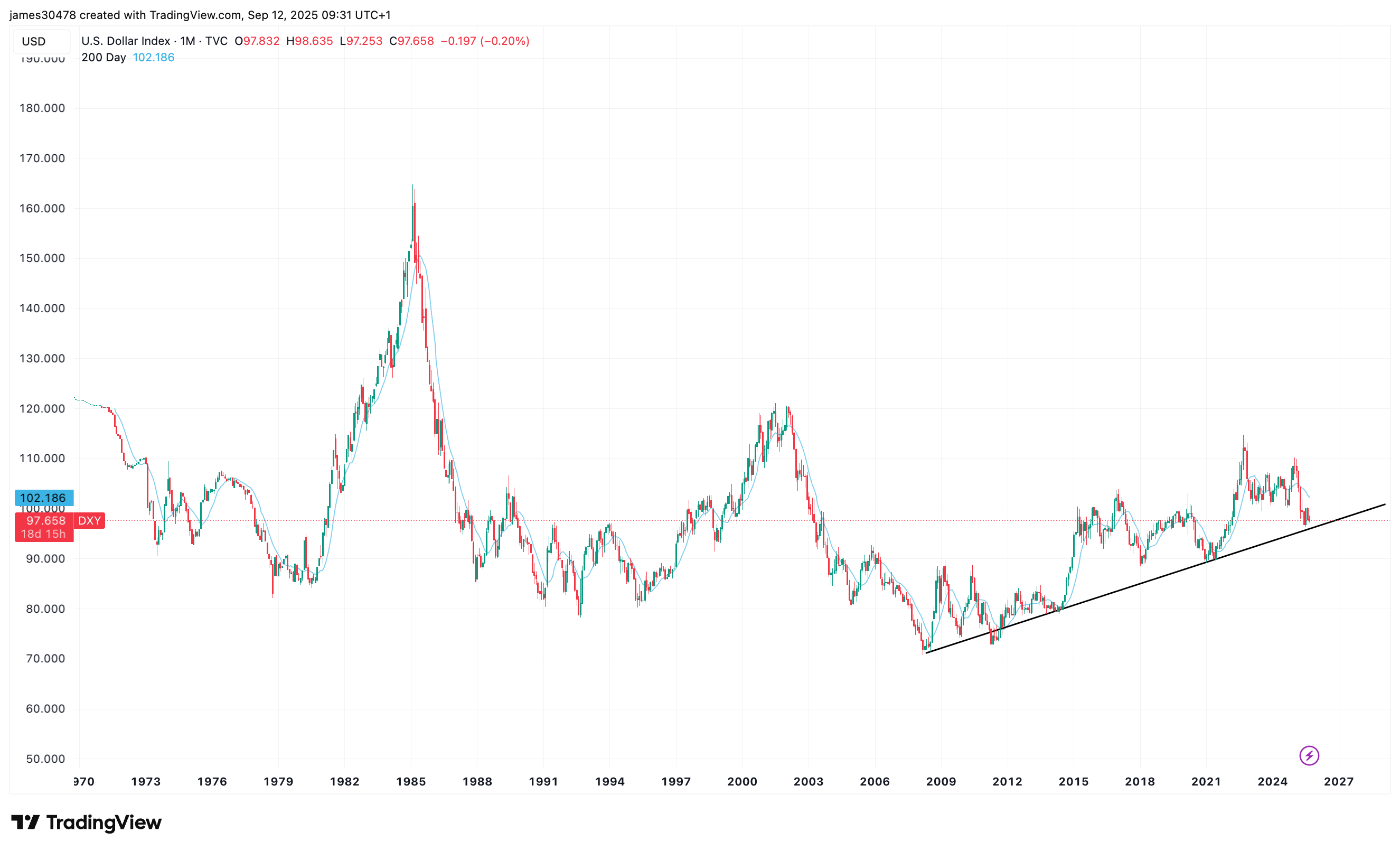
Uncategorized
Fed’s Sept. 17 Rate Cut Could Spark Short-Term Jitters but Supercharge Bitcoin, Gold and Stocks Long Term

Investors are counting down to the Federal Reserve’s Sept. 17 meeting, where markets expect a quarter-point rate cut that could trigger short-term volatility but potentially fuel longer-term gains across risk assets.
The economic backdrop highlights the Fed’s delicate balancing act.
According to the latest CPI report released by the U.S. Bureau of Labor Statistics on Thursday, consumer prices rose 0.4% in August, lifting the annual CPI rate to 2.9% from 2.7% in July, as shelter, food, and gasoline pushed costs higher. Core CPI also climbed 0.3%, extending its steady pace of recent months.
Producer prices told a similar story: per the latest PPI report released on Wednesday, the headline PPI index slipped 0.1% in August but remained 2.6% higher than a year earlier, while core PPI advanced 2.8%, the largest yearly increase since March. Together, the reports underscore stubborn inflationary pressure even as growth slows.
The labor market has softened further.
Nonfarm payrolls increased by just 22,000 in August, with federal government and energy sector job losses offsetting modest gains in health care. Unemployment held at 4.3%, while labor force participation remained stuck at 62.3%.
Revisions showed June and July job growth was weaker than initially reported, reinforcing signs of cooling momentum. Average hourly earnings still rose 3.7% year over year, keeping wage pressures alive.
Bond markets have adjusted accordingly. The 2-year Treasury yield sits at 3.56%, while the 10-year is at 4.07%, leaving the curve modestly inverted. Futures traders see a 93% chance of a 25 basis point cut, according to CME FedWatch.
If the Fed limits its move to just 25 bps, investors may react with a “buy the rumor, sell the news” response, since markets have already priced in relief.
Equities are testing record levels.
Equities are testing record levels. The S&P 500 closed Friday at 6,584 after rising 1.6% for the week, its best since early August. The index’s one-month chart shows a strong rebound from its late-August pullback, underscoring bullish sentiment heading into Fed week.

The Nasdaq Composite also notched five straight record highs, ending at 22,141, powered by gains in megacap tech stocks, while the Dow slipped below 46,000 but still booked a weekly advance.
Crypto and commodities have rallied alongside.
Bitcoin is trading at $115,234, below its Aug. 14 all-time high near $124,000 but still firmly higher in 2025, with the global crypto market cap now $4.14 trillion.

Gold has surged to $3,643 per ounce, near record highs, with its one-month chart showing a steady upward trajectory as investors price in lower real yields and seek inflation hedges.

Gold has climbed steadily toward record highs, while bitcoin has consolidated below its August peak, reflecting ongoing demand for alternative stores of value.
Historical precedent supports the cautious optimism.
Analysis from the Kobeissi Letter — reported in an X thread posted Saturday — citing Carson Research, shows that in 20 of 20 prior cases since 1980 where the Fed cut rates within 2% of S&P 500 all-time highs, the index was higher one year later, averaging gains of nearly 14%.
The shorter term is less predictable: in 11 of those 22 instances, stocks fell in the month following the cut. Kobeissi argues this time could follow a similar pattern — initial turbulence followed by longer-term gains as rate relief amplifies the momentum behind assets like equities, bitcoin, and gold.
The broader setup explains why traders are watching the Sept. 17 announcement closely.
Cutting rates while inflation edges higher and stocks hover at records risks denting credibility, yet staying on hold could spook markets that have already priced in easing. Either way, the Fed’s message on growth, inflation, and its policy outlook will likely shape the trajectory of markets for months to come.
-

 Business11 месяцев ago
Business11 месяцев ago3 Ways to make your business presentation more relatable
-

 Fashion11 месяцев ago
Fashion11 месяцев agoAccording to Dior Couture, this taboo fashion accessory is back
-

 Entertainment11 месяцев ago
Entertainment11 месяцев ago10 Artists who retired from music and made a comeback
-

 Entertainment11 месяцев ago
Entertainment11 месяцев ago\’Better Call Saul\’ has been renewed for a fourth season
-

 Entertainment11 месяцев ago
Entertainment11 месяцев agoNew Season 8 Walking Dead trailer flashes forward in time
-

 Business11 месяцев ago
Business11 месяцев ago15 Habits that could be hurting your business relationships
-

 Entertainment11 месяцев ago
Entertainment11 месяцев agoMeet Superman\’s grandfather in new trailer for Krypton
-

 Entertainment11 месяцев ago
Entertainment11 месяцев agoDisney\’s live-action Aladdin finally finds its stars





